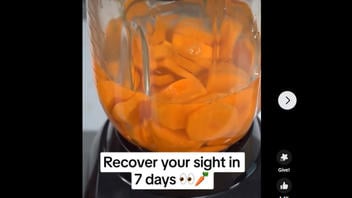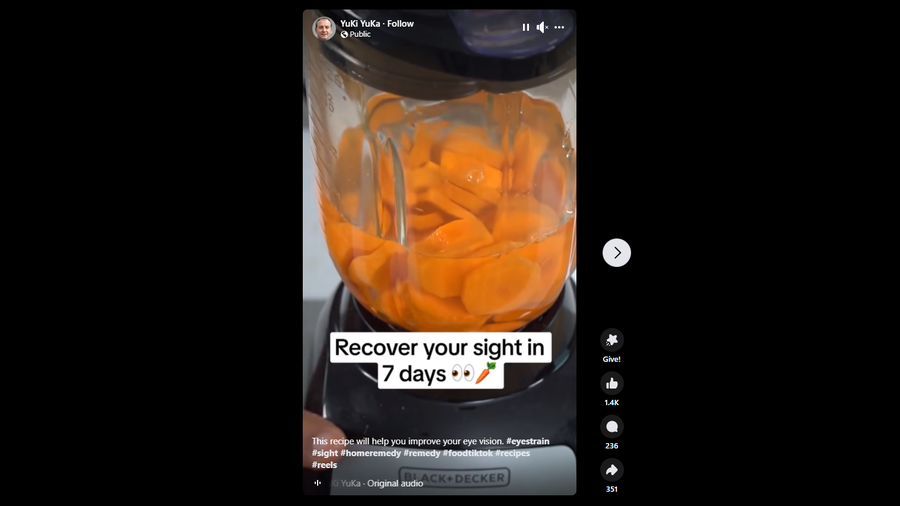STORY UPDATED: check for updates below.

Does a drink recipe mixing carrots, vinegar and baking soda, along with orange and lime juice, restore eyesight within a week? No, that's not true: The claim is not supported by scientific evidence. While carrots contain vitamin A, important for eye health, and citrus fruits like oranges and limes provide vitamin C, there's no credible research demonstrating that this combination can rapidly improve eyesight. An ophthalmologist told Lead Stories that unless you're one of the rare people in the developed world who has a vitamin A deficiency, the mixture is unlikely to help your vision at all.
The claim appeared in a post and video (archived here) published on Facebook by YuKi YuKa on April 17, 2024, under the title "Recover your sight in 7 days 👀🥕." The post's caption said:
This recipe will help you improve your eye vision. #eyestrain #sight #homeremedy #remedy #foodtiktok #recipes #reels
This is what the post looked like on Facebook at the time of writing:
(Source: Facebook screenshot taken on Thu Apr 25 14:43:35 2024 UTC)
The video
In the 82-second video, the narrator tells listeners how to make the fruit and vegetable mixture, along with touting its purported benefits. The voice, generated by artificial intelligence (AI) according to Resemble AI, said:
Mix baking soda with carrot and recover your sight in seven days. You will never have to wear glasses or lenses again.
... Carrots are noted for having a lot of vitamin A, which helps improve eyesight. It also contains vitamin C, which is effective in preventing eye diseases such as cataracts that protect the retina degeneration.
... When we do not consume enough vitamin A, the eyes cannot stay moist enough to prevent dry eyes. ...
Expert
Dr. Christopher Conrady, an ophthalmologist and retinal surgeon at Nebraska Medicine's Truhlsen Eye Institute, told Lead Stories in an April 25, 2024, email that the recipe in the clip "just supports general eye and body health," except if your diet lacks a particular vitamin. He continued:
This video overpromises unless you are one of the few patients in the developed world with vitamin A deficiency. Again, this is a very select few patients and is more common overseas than in the US due to our overall diet differences (US diet is very high in vitamin A). I suppose visual recovery could be relatively rapid in this condition. Otherwise, there are NO other eye conditions that I know of that a recipe of vitamin A and C will 'recover your sight in 7 days.'
Conrady added, "You could get these same vitamins in supplements but they are both extremely common in the foods we eat ... ."
American Academy of Ophthalmology
The American Academy of Ophthalmology (AAO) website echoes Conrady, saying eating carrots or other foods rich in vitamin A "won't improve your vision or keep you from needing glasses or contacts." The group's website includes the topic on its list of "20 Eye and Vision Myths":
Myth 4. Eating carrots will improve your vision.
Vitamin A is essential for the body to maintain healthy eyesight and carrots have high amounts of this nutrient. But the body only needs a relatively small amount of vitamin A for vision, and it can be obtained through many sources such as dark, leafy greens, brightly colored vegetables, dairy and fish.
National Eye Institute
In an April 26, 2024, email, Dr. Emily Chew, director of the Division of Epidemiology and Clinical Applications at the National Eye Institute (NEI) at the National Institutes of Health, told Lead Stories that a "diet rich in fruits and vegetables, lean protein, especially fish, and whole grains, is essential to maintaining good health, including that of your eyes." She continued:
There is no scientific evidence that specific food combinations or dietary supplements can improve eyesight or cure any degenerative diseases of the eye. That includes the carrot/baking soda mixture in the video.
Before taking any dietary supplements, you should consult with your doctor. Some dietary supplements can cause adverse effects and interact with medications you are already taking.
Additional information about the connection between nutrition and eye disease is available on the NEI website.
Read more
At the time this was written, the claim had previously been reviewed by Scientific American in 2014.
Other Lead Stories fact checks about health can be found here.
Additional Lead Stories fact checks of claims that mention carrots can be found here.
Updates:
-
2024-04-26T15:21:57Z 2024-04-26T15:21:57Z Adds context from Dr. Emily Chew at the National Eye Institute.


















